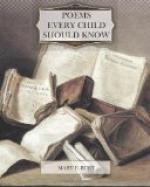Life! I know not what
thou art.
But know that thou and I must
part;
And when, or how, or where
we met,
I own to me’s a secret
yet.
Life! we’ve been long
together
Through pleasant and through
cloudy weather;
Tis hard to part when friends
are dear—
Perhaps ’twill cost
a sigh, a tear;
—Then steal away,
give little warning,
Choose thine own time;
Say not Good Night,—but
in some brighter clime
Bid me Good Morning.
A.L. BARBAULD.
MERCY.
“Mercy,” an excerpt from “The Merchant of Venice,” “Polonius’ Advice,” from “Hamlet,” and “Antony’s Speech,” from “Julius Caesar” (all fragments from Shakespeare, 1564-1616), find a place in this book because a well-known New York teacher—one who is unremitting in his efforts to raise the good taste and character of his pupils—says: “A book of poetry could not be complete without these extracts.”
The quality of mercy is not
strain’d;
It droppeth as the gentle
rain from Heaven
Upon the place beneath:
it is twice bless’d;
It blesseth him that gives,
and him that takes:
’Tis mightiest in the mightiest;
it becomes
The throned monarch better
than his crown:
His scepter shows the force
of temporal power,
The attribute to awe and majesty,
Wherein doth sit the dread
and fear of kings;
But mercy is above his sceptered
sway;
It is enthroned in the hearts
of kings,
It is an attribute to God
himself;
And earthly power doth then
show likest God’s
When mercy seasons justice.
SHAKESPEARE ("Merchant of Venice").
POLONIUS’ ADVICE.
See thou character. Give
thy thoughts no tongue,
Nor any unproportion’d
thought his act.
Be thou familiar, but by no
means vulgar:
The friends thou hast, and
their adoption tried,
Grapple them to thy soul with
hoops of steel;
But do not dull thy palm with
entertainment
Of each new-hatch’d,
unfledg’d comrade. Beware
Of entrance to a quarrel;
but, being in,
Bear ‘t that th’
opposed may beware of thee.
Give every man thine ear,
but few thy voice:
Take each man’s censure,
but reserve thy judgment.
Costly thy habit as thy purse
can buy
But not expressed in fancy;
rich, not gaudy:
For the apparel oft proclaims
the man.
Neither a borrower nor a lender
be;
For loan oft loses both itself
and friend,
And borrowing dulls the edge
of husbandry.
This above all: to thine
own self be true;
And it must follow, as the
night the day,
Thou canst not then be false
to any man.
SHAKESPEARE ("Hamlet").
A FRAGMENT FROM MARK ANTONY’S SPEECH.




